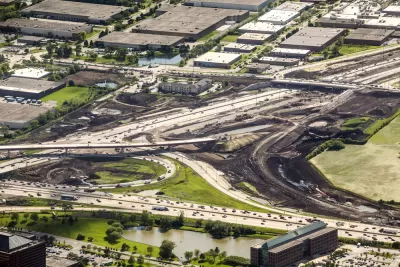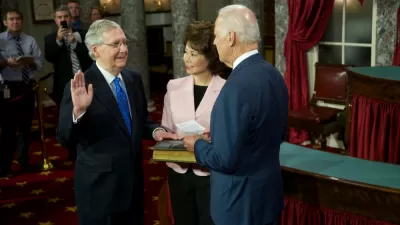President Donald Trump teased the release of his promised $1 trillion infrastructure earlier this month. Here's how a collection of experts reacted to that prospect.

An article for Grist by Nathanael Johnson and Matt Graft surveys a collection of experts on how they would spend the $1 trillion promised by President Trump to fix the nation's infrastructure. According to Johnson and Graft, "just about all" of the surveyed experts "panned Trump's ideas," so the article expresses an awareness that Trump might be over promising on this issue.
The collection of experts includes Lynn Richards, president and CEO of the Congress for New Urbanism; Aaron Renn, senior fellow at the Manhattan Institute; and Charles Marohn, founder and president of Strong Towns, among others.
In a separate article for CityLab, Anthony Flint provides a dispatch from the APA's National Conference in New York City, where Trump's expected infrastructure plans were "high on the agenda." Here, Flint also expresses reservations about the prospects for Trump's infrastructure plan by calling for a "stop-and-think moment." Flint's main concern: that rushing to build "shovel ready" projects will not allow for quality analysis of how projects will perform once they are built. Instead of "shovel ready", Flint suggests the following criteria:
A more cold-eyed approach fully considers the cost of funding, the length of the investment, and the duration of the benefits generated. Planners need to maximize benefits over the full lifecycle of any project, and be mindful of maintenance costs. Additionally, careful consideration should be given to what economists call non-pecuniary benefits and costs—those hard-to-measure ramifications.
Flint suggests more criteria, including resilience and sustainability, and points out some examples from the region and city surrounding the location of the APA's National Conference of how infrastructure projects can go wrong.
FULL STORY: How Trump could spend $1 trillion to fix America if he knew what he was doing

Maui's Vacation Rental Debate Turns Ugly
Verbal attacks, misinformation campaigns and fistfights plague a high-stakes debate to convert thousands of vacation rentals into long-term housing.

Planetizen Federal Action Tracker
A weekly monitor of how Trump’s orders and actions are impacting planners and planning in America.

In Urban Planning, AI Prompting Could be the New Design Thinking
Creativity has long been key to great urban design. What if we see AI as our new creative partner?

King County Supportive Housing Program Offers Hope for Unhoused Residents
The county is taking a ‘Housing First’ approach that prioritizes getting people into housing, then offering wraparound supportive services.

Researchers Use AI to Get Clearer Picture of US Housing
Analysts are using artificial intelligence to supercharge their research by allowing them to comb through data faster. Though these AI tools can be error prone, they save time and housing researchers are optimistic about the future.

Making Shared Micromobility More Inclusive
Cities and shared mobility system operators can do more to include people with disabilities in planning and operations, per a new report.
Urban Design for Planners 1: Software Tools
This six-course series explores essential urban design concepts using open source software and equips planners with the tools they need to participate fully in the urban design process.
Planning for Universal Design
Learn the tools for implementing Universal Design in planning regulations.
planning NEXT
Appalachian Highlands Housing Partners
Mpact (founded as Rail~Volution)
City of Camden Redevelopment Agency
City of Astoria
City of Portland
City of Laramie





























